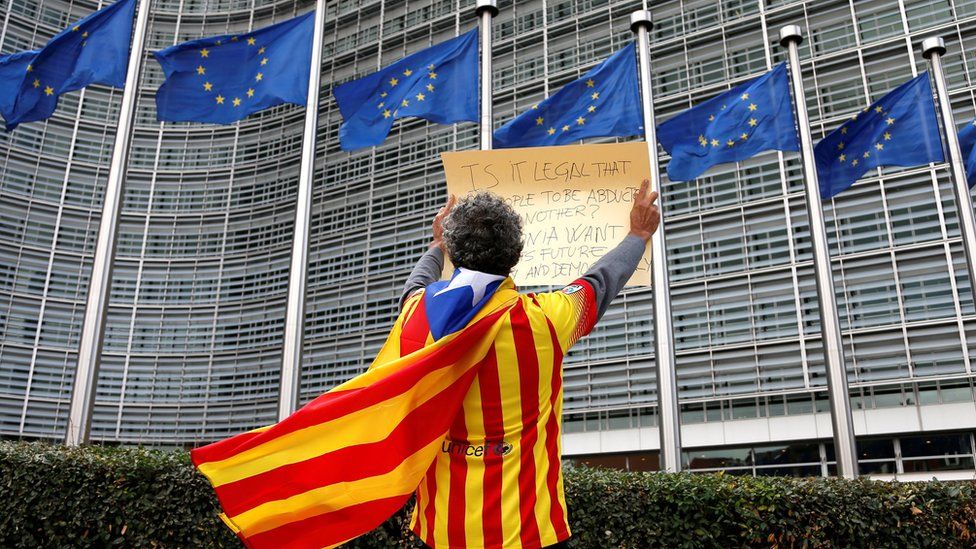Spain Catalonia: France snubs independence bid
- Published

The French government has said it will not recognise Catalonia if it declares independence from Spain and such a move will mean expulsion from the EU.
European Affairs Minister Nathalie Loiseau said the crisis following the banned 1 October referendum had to be resolved through dialogue within Spain.
Catalan President Carles Puigdemont is expected to address the regional parliament on Tuesday.
There has been no sign of a compromise being struck with Madrid.
Economic pressure on the pro-independence camp is rising with three more companies expected to discuss moving their offices out of Catalonia on Monday, sources told Reuters news agency.
Voters in Catalonia explain why their reasons for backing or rejecting independence
These are infrastructure firm Abertis, telecoms company Cellnex and property group Inmobiliaria Colonial.
Major lenders Caixabank and Sabadell announced earlier that they were moving their offices out of the region.
The region of Catalonia, home to 7.5 million people in the north-east, is crucial to Spain, which is the EU's fifth-biggest economy and a member of Nato.
In other developments:
- Catalonia's High Court asked for Spanish national police to provide extra security at the court building in the event of the Catalan parliament declaring independence; the building is currently guarded by local police
- The leader of Spain's Socialist opposition party, Pedro Sanchez, told reporters in Barcelona that his party would back government action if independence was declared unilaterally on Tuesday: "We reach out for dialogue but we'll support the response of the rule of law in the face of any attempt to break social harmony"
"If there was a declaration of independence, it would not be recognised," Ms Loiseau told French broadcaster CNews (video in French).
"The first consequence would be its exit from the European Union."
"Obviously," she added, "there is more to Catalonia than the consultation organised by the independence movement...
"This crisis needs to be resolved through dialogue at all levels of Spanish politics."
Casting doubt on the validity of the vote, she described Spain as a "great democracy" and pointed to the "particularly" high level of devolution its regions already enjoyed.
However, Catalans have long been calling for more say in spending, higher status for their language and recognition that they are a nation distinct from Spain.
Could the EU throw out an independent Catalonia?
By Damian Grammaticas, BBC News Europe correspondent
It Catalonia were to split from Spain, the region would immediately cease to be part of the European Union, the EU has made clear.
While EU's treaties don't specify what happens if part of a member state declares independence, EU sources say what's called the "Prodi doctrine" would apply.
Named after the former president of the European Commission Romano Prodi, the position is that a region seceding from a member country is automatically no longer part of the EU.
It means that, on the day any Catalan independence took effect, Catalonia would quit the EU; it would lose the right to free movement around Europe for any holders of Catalan passports, and for goods and services too.
Even using the euro as a Catalan currency could prove problematic. And Catalonia could only rejoin the EU by starting a new membership application, as a new country.
But any existing member state could veto this. So Spain, or any other country, could prevent an independent Catalonia's EU membership.
Catalonia's parliament had been due to meet on Monday with the expectation that it would endorse the declaration of independence, based on the majority Yes vote on 1 October.
However, the session was blocked by the Spanish Constitutional Court, which had likewise sought to stop the referendum itself.
Speculation is intense as to what Mr Puigdemont may say when he addresses the parliament in Barcelona on Tuesday evening.
He could ask the parliament to declare independence on the basis of the referendum law it passed last month, which in turn could lead the Spanish government of Prime Minister Mariano Rajoy to suspend devolution, acting under Article 155 of the constitution.
The BBC understands that whatever Mr Puigdemont says, his statement will trigger the 48-hour period within which MPs need to declare independence, according to the Catalan law.
It is also understood the Catalan leadership has already decided on the way forward.
An MP from Mr Puigdemont's party told the BBC on Sunday that the current plan was to stop short of declaring independence unilaterally and make a "symbolic statement" instead.
Thousands gathered at political rallies in Madrid and Barcelona
Final results from the referendum suggest 43% of Catalan voters turned out and 90% of them backed independence - but "No" voters largely boycotted the ballot.
At least 350,000 people joined a unionist rally in Barcelona on Sunday, after recent massive rallies by separatists and democracy activists in the city.
The crisis has been largely peaceful, although some 900 civilians and 33 police officers were hurt on referendum day when police sought to stop the vote at some polling stations by force.
Are you in Catalonia? Are you affected by these events? Email haveyoursay@bbc.co.uk
You can also contact us in the following ways:
- Tweet: @BBC_HaveYourSay
- WhatsApp: +447555 173285
- Text an SMS or MMS to 61124 (UK) or +44 7624 800 100 (international)
- Please read our terms & conditions
- Published7 October 2017
- Published6 October 2017
- Published26 March 2018
- Published3 October 2017
- Published4 October 2017
- Published2 October 2017